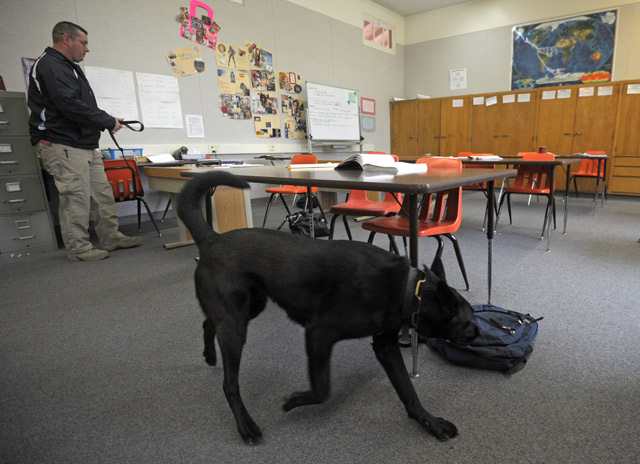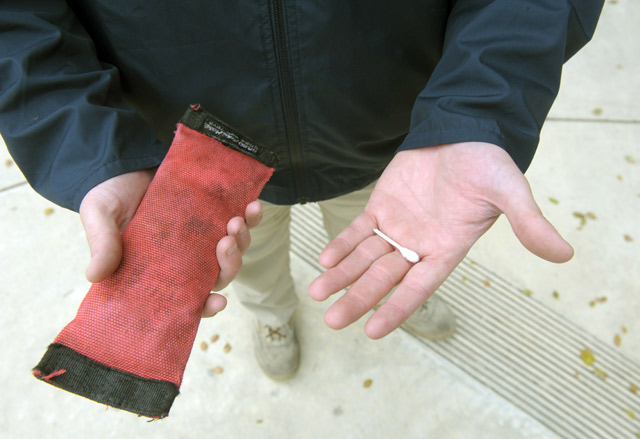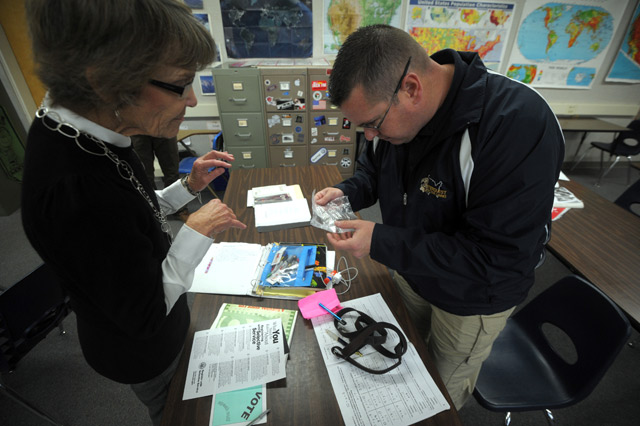Passing the Sniff Test
School District to Bring Drug-Detecting Dogs to Campuses

I ain’t no snitch and I don’t have much of a mean streak, but, man, did I want to see Skeeter bust a kid at Chaparral High School when I visited a few weeks ago.
I couldn’t help but get caught up in the thrill of the chase when, on a recent Friday, Paul Wellman, the Santa Barbara Independent’s staff photographer, and I braved the early morning mist on Casitas Pass to spend some time at Ojai’s continuation high school with Skeeter — a Labrador–Australian-cattle-dog mix — and his handler, Mike Post, who works Ventura and Santa Barbara counties for Interquest Detection Canines.
Up for vote at the next Santa Barbara Unified School District board meeting will be a contract with the Los Angeles franchise of Interquest, which is based in San Marino and owned by a former police officer named Scott Edmonds. Before going to see one of his dogs in action, I spoke to Edmonds about the business he started when he saw on the Internet that Interquest was seeking new franchisees 12 years ago. He now boasts 340 clients consisting of individual schools and entire districts.

Edmonds is adamant that the service he provides is completely different from law enforcement. “We don’t interrogate students. We don’t question them,” he explained. “We don’t get involved in enforcement at all. My handlers don’t have guns, cuffs, or radios. Our handlers do not chase students. Our dogs do not chase them. If we find two dime bags of marijuana in a student’s backpack, we don’t do anything at all.”
Skeeter is trained to detect narcotics as well as commonly abused prescription drugs and gunpowder with his nose, whose sense of smell is roughly 10,000 times stronger than the average human’s. Like most of Interquest’s canines, Skeeter is a rescue dog. He came to Edmonds from the police department in Fruitvale, Idaho, which was forced to shut down its K-9 program due to budget cuts. A work dog, Skeeter lives with Post but does not get to play fetch or participate in typical doggie shenanigans as does Post’s other dog. Any positive reinforcement that Skeeter receives must be a reward for correctly “alerting” on contraband, which is what we went to Ojai to see him do.
Chaparral High is composed of only three classrooms, wedged behind the district offices. By the time Post was ready to search the first classroom, its students were already waiting patiently outside, their bags and purses on the floor by their desks. Skeeter first took a pass around the room, hopping haphazardly from desk to desk before Post directed him to every single bag in the room, all of which he nuzzled with his snout, hoping to detect contraband and win the reward of a red vinyl play toy.
When Skeeter leaped onto a desk and poked his nose into a pencil bag in an open binder, my heart began to pulse. Marilyn Smith, the principal of Chaparral, pulled out a folded plastic baggie, but sadly, when she unraveled it, there was nothing, not even a lousy ecstasy pill.
Post provided us with a simulation of an alert, however, by placing a Q-tip dipped in marijuana-scented oil into a backpack. He does this regularly to test and reinforce Skeeter’s sniffing accuracy. When Skeeter finds it, he sits on his haunches with his ears alertly pointed skyward and stares at Post, panting.
The classroom search took only two or three minutes. And because Chaparral is so small, Post could search the whole school as well as some of the cars in the parking lot. At a bigger school, only a few randomly selected classrooms are searched during an Interquest visit. When Smith asked that Skeeter search a specific car — students and teachers share a parking area, and she knew this specific car to be a student’s — Post had Skeeter sniff out a few other cars before the one in question so as not to suggest to his fanged partner that there was something to be found in that one car.

Post said that Skeeter once alerted on a car at Bishop Diego High School — another Interquest client — but when he started listing all of the contraband items that Skeeter can detect — which he does with the speed and cadence of an auctioneer — the car’s owner insisted that it was impossible any of them were present. He had never even smoked a cigarette, he said. Finally, when Post got to the last item on his list, the light bulb went off. The young man’s family had just returned from a trip to Mexico and brought back with them a stash of bottle rockets.
The variety of drugs that he finds at private schools, said Post, tends to be more exotic than those at public schools. His most surprising find: heroin at a Los Angeles high school. Marijuana and alcohol are the most commonly detected contraband items, followed by methamphetamine. There are some schools where Skeeter has never detected anything, said Post, but they like having the searches as a deterrent.
To hear Edmonds explain Interquest, its main goal is to deter, not to discipline and punish. If students, tipped off via text that a dog is at their school on a particular day, flush their drugs down the toilet or throw them on the roof, all the better. At least someone isn’t getting high on campus that day. And maybe they’ll think twice about doing it in the future.
Post does not direct Skeeter to teachers’ desks when searching classrooms, but dogs do sometimes detect drugs on teachers’ belongings or in their cars. At that point, it is a matter for the school district and teachers union to handle. Or as Post told a principal recently when Skeeter alerted on a teacher’s car, “This is your headache.”
Whether contraband-detecting dogs are a smart long-term strategy for keeping drugs off campuses is up for debate. Whether it is legal is not. Whether they are coming to Santa Barbara’s public schools is not either. The right of a school administrator to ensure a safe campus trumps the privacy rights of a minor, as Principal Smith explained it. So Skeeter might just be sticking his snout in your kid’s backpack next fall.



